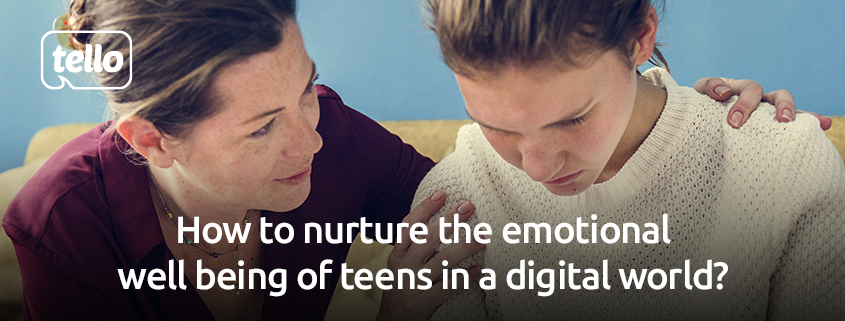Teenage Wellbeing & Happiness
Being a teen was never easy.
It wasn’t easy back in the day, yet in these times, it seems harder than ever.
For those of you who don’t believe it, we urge you to remember the worst day you had in high school. We all had one. Now, imagine that your most embarrassing moment is replayed 100 times per day, because one of your colleagues filmed it and posted it online, where it’s going to stay forever.
As a parent, you no longer have to guide your kid through life’s challenges in real life, but also steer them clear of the dangers of the digital world they so love to wander in. One of the pitfalls of smartphones is how much screen time affects children’s wellbeing.
💬 Jean Twenge, a professor who’s been researching generational differences for more than 25 years, states that today’s teens are shaped to such an extent by the smartphone and social media that she calls them the “iGen.” Based on an impressive amount of data and surveys, it appears that the iGen is on the brink of the worst mental-health crisis.
How can parents play a role in ensuring healthy development?
-
Face the facts: The entire world is becoming more and more digitally driven
The first thing is to acknowledge that even if you are nostalgic about how things used to be while you were growing up, there’s no need to deny it or try to paint a different picture for your kids or to deliberately hide from technology. Nobody will benefit from that.
✅ Also, try to remember the way your parents used to react when you were a teen and how they didn’t seem to get your generation at all. The best thing to do is to put yourself in your past self’s shoes, and not in those of your parents. Reconnect with those memories and feelings and let them guide you towards a better understanding of what’s going on with your kid.
-
Teens musts: Listening and being valued are the important keys in ensuring teenagers will respond well
They just want to be seen & heard, while having a sense of independence.
While toddlers are happy swiping up and down every day, with no particular need other than seeing and clapping along a bus or a happy pig, teens have a social life. They don’t want you meddling or prying in their online conversation.
Make sure your kids know you are keeping an eye on their safety and wellbeing, which is totally normal, instead of spying on them and thus, not meeting their privacy needs.
Researcher Danah Boyd offers a smart strategy for establishing trust with children while having access to their online accounts if needed: “Parents ask children to put passwords into a piggy bank that must be broken for the paper with the password to be retrieved. Such parents often explain that they don’t want to access their teens’ accounts, but they want to have the ability to do so ‘in case of emergency.’ A piggy bank allows a social contract to take a physical form.”
-
Teach them responsibility
You cannot control their every online move.
Moreover, digital literacy is and will be in high demand for every future job they might aspire to, so developing strong skills in this area will be a plus for them. Still, for safety reasons, it’s good to enforce a much needed balance and some ground rules:
❌ Don’t text & drive
❌ Don’t post inappropriate videos & pictures
❌ Check in with parents when leaving a friend’s house to come home
Also, find a balance between their on-screen time and other activities – play time, outside & physical activities for them, as well as the entire family to enjoy.
✅ Screen-free zones & times: Establish rules for when the family should not be on their devices, such as two hours before bedtime and during meals, even if eating out. Similarly, set up screen-free zones in your home.
✅ Be a role model: use your devices as you want your kids to. Don’t enforce rules that you don’t follow. If you have your head buried in your phone during dinner, how do you expect to get your teen to do differently?
-
Pay Attention to their emotions
It’s no longer a mistery that the growth of social media and technology use is associated with rising rates of depression, anxiety, and suicide. CyberBullying becomes an issue for children ever since they’re in grade school and stats show that 1 in 3 kids have experienced it.
✅ Pay attention to negative emotions your teen might be experiencing after screen time. He might be dealing with bullying or being ostracised by his peers. Don’t take it lightly and open up the dialog about it, while keeping in mind his personality and needs.
The important thing is to let your kid know it’s OK to come to you when something happens, that you won’t get mad or take his phone away, in an attempt to keep him safe. Istead, you’re there to help him address this in a fair and healthy way. Remind your child to treat others the way he or she would like to be treated.




Leave a Reply
Want to join the discussion?Feel free to contribute!